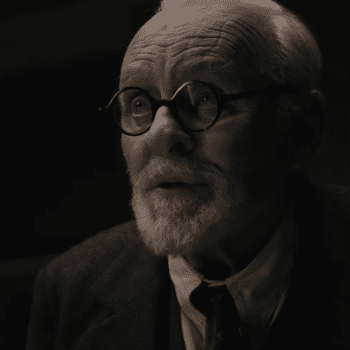My favorite movie? It might be The Mission.
The 1986 movie unpacks the story of Jesuit missionary Father Gabriel (Jeremy Irons), who ministers to South America’s Guarani people and trying to protect them from European slavers. Soon he meets with Rodrigo Mendoza (Robert De Niro), one of the region’s most notorious slavers, in a prison cell: Mendoza, who murdered his own brother, refuses to see anyone, and he’s slowly starving himself to death.
“For me there is no redemption,” Mendoza says. “No penance great enough.”
“There is,” Gabriel insists. “But do you dare to try it?”
I’ve thought of that scene often over the last several weeks.
It seems like our whole fabric has been shaken by allegations of sexual abuse and harassment by powerful, powerful men. Doctors and politicians have been accused. Scandal has torn down Hollywood moguls and talented actors and, most recently, comedian Louis C.K.
Rightly so.
For far too long, these sexual misdeeds in Hollywood were hidden and excused, heinous acts perpetrated by men with blighted consciences. Ruined careers and public shame and even jail time, where warranted, won’t heal the victims’ wounds. But justice demands some form of recompense, as feeble as it might seem.
Our secular culture, perhaps belatedly, is calling out sin for what it is.
But when these men are brought low, what then? What after? How can they, and we, move on?
I don’t know if the secular culture has a great mechanism for moving on. It’s a passionate creature, raging and vehement at moments, lethargic and forgetful at others. It can be really good at righteous fury: Frankly, for all the flak the Christian Church gets for being judgmental and intolerant, we Christians could learn a thing or two about real, righteous intolerance from our current climate: When priests and pastors commit truly despicable acts on children—the most innocent and vulnerable members of their flocks—with few and feeble consequences from the church at large—that signals to me a Church that’s lost its way.
But at the same time, I think there’s something beautiful, if difficult, about how Christianity deals with sin, an element that the secular world doesn’t really have: A mechanism for forgiveness.
Our faith is predicated on forgiveness. Few of us have committed the sins of a Weinstein or a Spacey, but we all sin. Like my pastor used to say, if a news crew came by and pried open our hearts—if they poked around our hidden deeds and secret desires—they, too, would find a story.
Sometimes, perhaps, we make forgiveness too easy. That’s especially true in my evangelical faith tradition, where we acknowledge so freely our need for forgiveness and God’s boundless willingness to forgive. Yes, we still believe that our sins need to be confessed. But once we turn over our lives to Him, I’ve been taught, we’re family. We can’t be kicked out.
But I think that evangelicals, and frankly the culture at large, can find value in the more Catholic discipline (as I understand it) of confession, repentance and penance.
In The Mission, we see that path play out. Mendoza’s penance is indeed difficult—incredibly so. He joins Gabriel’s trek back to the Guarani, dragging a full suit of armor behind him. If he makes it that far, he’ll need to face the very people he spent his career enslaving. They will decide what will be done.
“Father, he’s done this penance long enough,” Father Fielding (played by a young Liam Neeson) says shortly before the scene above.
“But he doesn’t think so, John,” Gabriel tells him. “Until he does, neither do I.”
The completion of Mendoza’s penance makes for one of cinema’s most moving moments.
When it comes to moving past sin, we need to confess. We need to repent. And sometimes, I think we need penance. Not because God needs it: Because we do.
It’s hard to confess sin. Producer Harvey Weinstein’s initial confession felt like a half-measure to many, admitting to some misdeeds while laying the blame on the age he grew up in. If the allegations are true against a certain Alabama politician—a man whose support hinges largely on his “Christian character”—he refuses to take responsibility at all.
But for whatever his other faults, Louis C.K. understands confession. “These stories are true,” he said in a statement to Entertainment Weekly. ” … The hardest regret to live with is what you’ve done to hurt someone else. And I can hardly wrap my head around the scope of hurt I brought on them.”
I don’t know what contrition and repentance should look like for Louis C.K., or for any of these men. I don’t know what penance looks like. And should he, and they, reach a point where they can be “forgiven” for their acts, I don’t know if that means they can or should return to their careers. The Christian concept of restoration is about a person’s life, not livelihood.
But I do believe that the way forward—for them, for their victims, for us—is centered in the difficult, painful path of forgiveness.
Not everyone will get there. Not everyone can. But I’m not sure if anyone can truly heal without it.













